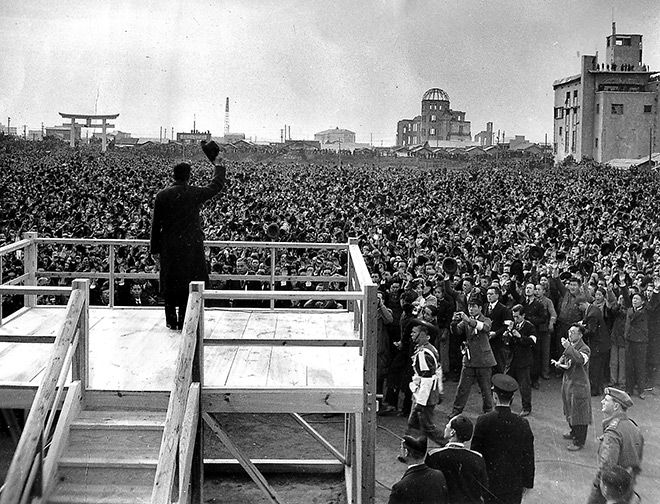Emperor Naruhito and Empress Masako will visit Hiroshima Prefecture on June 19 and 20 to mark the 80th anniversary of the end of World War II.
In Hiroshima, where the first atomic bomb was dropped, many still have complex feelings about the imperial family.
This will be the couple’s first visit to Hiroshima since they ascended to the positions of emperor and empress, and they are scheduled to meet directly with hibakusha, atomic bomb survivors, on the trip.
EMPEROR HIROHITO
During the war, even after Japan’s defeat appeared inevitable, Japanese leaders persisted in maintaining the imperial system, which delayed the end of the war.
During this period of delay, the United States dropped atomic bombs on Hiroshima and Nagasaki.
That historical context continues to shape the perspectives of some people in Hiroshima today.
Emperor Hirohito, posthumously known as Emperor Showa, visited Hiroshima three times after the war, starting in 1947 on a postwar tour across Japan.
During his last visit in 1971, he visited the Cenotaph for the Victims of the Atomic Bomb for the first time and told the gathered hibakusha that he was overwhelmed by emotion.
However, at a news conference in 1975, when a reporter from Hiroshima asked Hirohito about the atomic bombing of the city, the emperor said, “I’m sorry for the people of Hiroshima, but I think the atomic bombing was unavoidable.”
This remark caused a stir.
EMPEROR EMERITUS AKIHITO
After his first trip to Hiroshima in 1949 at the age of 15, Emperor Emeritus Akihito consistently visited the cenotaph and never forgot the hibakusha whenever he traveled there.
When he was still a student, he sometimes asked his classmates, “Why did the atomic bombs have to be dropped?”
He educated his children from a young age about the atomic bombings and their historical context.
He also consistently offered silent prayers on the anniversaries of the bombings.
EMPEROR NARUHITO AND EMPRESS MASAKO
The current emperor and empress also visited Hiroshima before ascending the throne.
In 1996, Hiroshi Harada, 85, then director of the Hiroshima Peace Memorial Museum, showed the couple around the museum.
He said he remembered well that they asked questions and looked carefully at the burned lunch boxes and water bottles on display during their visit.
“The emperor and empress must have heard all about Hiroshima from their parents and had prepared for the visit,” Harada said he thought at the time.
Harada also said Naruhito told him, “It is an extremely important job to talk about peace to many people.”
Naomi Abe, 80, who was head of nursing at Hiroshima Red Cross Hospital and Atomic Bomb Survivors Hospital for many years, also remembers encountering Naruhito.
In July 1992, Naruhito visited the hospital and went from room to room seeing patients.
An elderly woman asked him, “Who are you?”
Everyone in the room was stunned by her question, but Naruhito bent down to her, made eye contact and answered with a smile, “I’m the crown prince.”
PRINCESS AIKO
Princess Aiko, the only child of Naruhito and Masako, wrote an essay titled “Pray for World Peace” for a collection of graduation essays.
The essay was based on her experience visiting Hiroshima on a school trip in spring 2017.
“We Japanese people need to send messages to the world of what we saw and felt,” she wrote.
After learning about the essay, Harada said he strongly felt that Aiko had inherited a wish for peace from her grandparents and parents.
He said he hopes that the scheduled imperial couple’s visit will serve as a catalyst for spreading the wish for a peaceful age.
MOURNING APPROPRIATE FOR REIWA ERA
Hideya Kawanishi, associate professor of history at the graduate school of Nagoya University, said a meeting between the imperial couple and members of Nihon Hidankyo (Japan Confederation of A- and H-Bomb Sufferers Organizations) is not scheduled for the imperial couple’s visit.
After the organization was awarded the Nobel Peace Prize, the emperor expressed his admiration for the longstanding efforts of its members at a news conference held on his birthday.
Under the postwar Constitution, the emperor is a symbol of the state, and the imperial family has avoided involvement in political issues.
The meeting with Nihon Hidankyo may have been avoided since the group has disagreed with the government on several issues, including whether Japan should sign the Treaty on the Prohibition of Nuclear Weapons and how to support atomic bomb survivors.
Still, Kawanishi finds it regrettable that a meeting will not take place.
Questions remain about how the emperor will confront the reality that many people still have not been compensated for war-related damages, even 80 years after the war’s end.
Kawanishi said the Imperial Household Agency should understand Naruhito’s thoughts and organize events that are appropriate for the Reiwa Era in collaboration with the emperor.


AloJapan.com